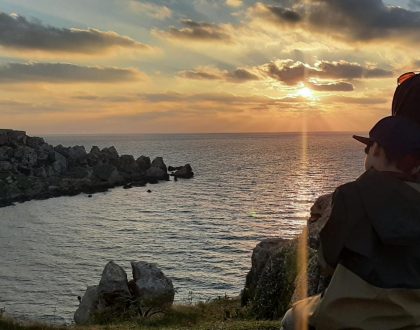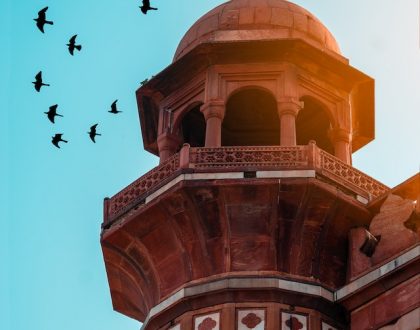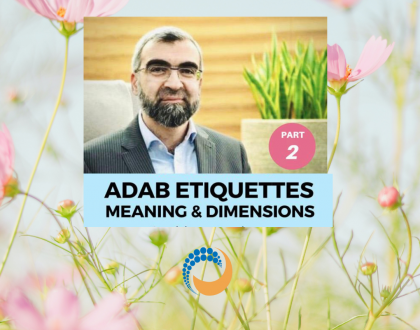Finding our purpose from how we came into existence

by Abu Shama
The Greatest Gift is to understand the Deen
The Messenger of Allah (peace be on him) mentioned one of the greatest virtues of knowledge as recorded by Imam Bukhari, he said:
‘Whomsoever Allah wishes good for, He gives him understanding in Deen (religion)’
[Bukhari]
The person who finds Deen understands the basic principles of this life and the next life to come.
He comes to understand three basic aspects to his existence in this world, namely, how he came to exist, why he exists or what is behind the purpose of his existence in this world, and finally, what is his destiny i.e. where is he heading towards?
Deep and immensely beautiful, this is a very comprehensive hadith, and many lessons can be derived from it. It brings solace to the heart in times of hardships and truly inspires and motivates people to carry on in the way of Allah. It brings a smile to all those who understand the meaning of the hadith and provides a way to a truly happy life full of goodness and richness.
Deen is knowledge regarding Allah, His names and attributes, knowledge of His rights over His creation, and what He, the One free from all defects, the Most High, has prescribed for them. It is the detailed knowledge of the path that leads to Allah which then leads to self knowledge; knowledge of the purpose of our creation; and the end which the slave will result in, in the Hereafter.
Let us begin by reminding ourselves how we came to existence, how we find ourselves on Earth and where we fit in Allah’s grand design; I hope this would benefit us to appreciate the value of this life.
Story of Creation
Whilst the Messenger of Allah (peace be on him) was sitting in the Masjid in Medina, some people from Yeman came to the Messenger of Allah (peace be on him) and asked how the creation started. The Messenger of Allah (peace be on him) said:
‘Initially Allah was alone and there was nothing else before Him. He created His Throne, and His Throne was over the water, and He then created the Heavens and the Earth and wrote everything in the Book.’
[Bukhari]
At first there was Allah with no creation. Then from His infinite mercy He decided to create creation. Within that creation, He created the universe, the stars, the sun, the moon, the planets, and amongst the planets He created the Earth; our home. And on Earth He created the trees, He created animals, animate objects and inanimate objects.
Allah then created Adam; the father of mankind. The Messenger of Allah (peace be on him) said:
‘Allah, the Exalted and Glorious, created the clay on Saturday and He created the mountains on Sunday and He created the trees on Monday and He created the things entailing labour on Tuesday and created light on Wednesday and He caused the animals to spread on Thursday and created Adam after Asr on Friday; the last creation at the last hour of the hours of Friday, i.e. between afternoon and night.’
[Muslim]
In another narration, the Messenger of Allah (peace be on him) said:
‘When Allah created the Earth it began to oscillate, so He created the mountains, ordered them onto it, and it became steady. The Angels marvelled at the strength of the mountains and asked their Lord whether there was anything in His creation stronger than the mountains, to which He replied that iron was stronger.
They asked if anything in His creation was stronger than iron, and He replied that fire was. They asked if anything in His creation was stronger than fire and He replied that water was. They asked if anything in His creation was stronger than water and He replied that wind was. They asked if anything in His creation was stronger than wind and He replied, ‘Yes, the son of Adam who gives sadaqah with his right hand which concealing it from his left.’’
[Tirmidhi]
It is His blessing and favour upon us that we ended up as the pinnacle of all the creation. When Allah decided to create, the very essence of our creation could have so easily have been of that of an inanimate object; or a rock locked in the depth of a forest, or a dog or even a fly, and that would have been our existence. There are more than a billion kinds of other creations out there in the universe and we could have so easily been from any of them. There was nothing to bind Allah to create us as human being yet He did.
In Surah Baqarah verses 31-33, Allah recalls for us the conversation between Himself, the Angels and Prophet (peace be on him) Adam.
Allah said: ‘And He taught Adam all the names of everything.’ After Adam had learned the names of all things, along with their properties and usages, Allah presented them to the Angels and said: ‘Tell Me the names of these if you are truthful.’ The Angels admitted their inability: ‘Glory be to You, we have no knowledge except what You have taught us. Verily, it is You, The All-Knowing, The All-Wise.’ Allah then turned to Adam: ‘O Adam! Inform them of their names,’ and when he had informed them of their names, the Angels realized that Adam knew what they did not know and that his capacity to learn was his noblest quality. It shows that Adam has a higher status than the Angels and that he is the pinnacle of all the creation inclusive of all that is in the Heavens and the Earth.
Allah granted Adam the power to know the natures of all things and to summarize them by names: That is a bird, that is a star, that is a tree, that is a cloud, etc. Allah implanted in Adam an insatiable need for and love for knowledge and a desire to hand down knowledge to his children. His knowledge included knowledge of the Creator and as well as the knowledge that he would need to inhabit and master the Earth, and all kinds of worldly knowledge which are included in this.
Adam and Eve living in Paradise
Adam and Eve were admitted to Paradise and there they lived the dream of all human beings. Allah permitted them to approach and enjoy everything except one tree. Allah forbade them before they were given abode in Paradise:
O Adam! Dwell you and your wife in the Paradise and eat both of you freely with pleasure and delight of things therein as wherever you will, but come not near this tree or you both will be of the wrong doers.
[Baqarah:2:35]
Adam’s Weakness
Adam and Eve understood that they were forbidden to eat the fruit of that tree. Adam was, however, a human being, and man tends to forget. His heart changes and his will weakens. Shay’tan summoned all the envy within him and took advantage of Adam’s humanity to exploit him. He started to whisper to him day after day, enticing him: ‘Shall I guide you to the Tree of Immortality and the Eternal Kingdom?’ And he said to them: ‘Your Lord did not forbid you this tree save you should become Angels or become of the immortals.’ And Shay’tan swore by Allah to them both (saying):
‘Verily, I am one of the sincere well-wishers for you both.’
[Al-Araf: 7: 20]
Adam asked himself: ‘What will happen if I eat from this tree? It might truly be the Tree of Immortality.’ His dream was to live forever in the delights of Paradise.
Adam and Eve Eat from the Forbidden Tree
Years went by, and Adam and Eve were preoccupied with thoughts of that tree. Then, one day, they decided to eat of its fruit. They forgot that Allah had warned them not to approach it and that Shay’tan was their sworn enemy. Adam stretched out his hand, picked one of the fruits and offered it to Eve. They both ate of the forbidden tree. Allah recalls this in the Qur’an:
‘Thus did Adam disobey his Lord, so he went astray.’ & ‘So Shay’tan misled them with deception.’
[Ta Ha: 20: 121] & [Al-Araf: 7: 22]
Allah then addressed him:
‘Did I not forbid you that tree and tell you: Verily, Shay’tan is an open enemy unto you?’ They said: ‘Our Lord! We have wronged ourselves. If You forgive us not, and bestow not upon us Your Mercy, we shall certainly be of the losers.’ Allah said: ‘Get down, one of you an enemy to the other (i.e., Adam, Eve, and Shay’tan.). On Earth will be a dwelling place for you and an enjoyment for a time. Therein you shall live, and therein you shall die, and from it you shall be brought out (i.e. resurrected and returned on the Day of Judgement).’
[Al-Araf: 7: 22-25]
Descent from Paradise
Adam and Eve bade farewell to their place in Paradise and descended upon the Earth. Adam was sad and disheartened to leave Paradise. Allah accepted their repentance because it was sincere. He told them that they were going to be vicegerents on Earth. Earth would be their realm and origin where they would live and die and return back to Him on the Day of Judgement.
A valuable lesson learned
Shay’tan took advantage of Adam and Eve due to their innocence and naivety. They now knew from their practical experience that Shay’tan could not be trusted as a friend, and it was Shay’tan who was part of their cause for distress.
This experience was essential for their life on Earth; it was a cornerstone of their vicegerency. It was meant to teach Adam, Eve and their progeny that it was Shay’tan who was their enemy; it was Shay’tan who had caused them to lose the blessing of living in Paradise and being expelled from Paradise. And that the road back to Paradise can only be reached by obedience to Allah and enmity to Shay’tan.
A life of toil and struggle
On Earth Adam had to face conflict and struggle. No sooner had one ended then another began. He also had to toil to sustain himself. He had to protect himself with clothes and weapons and protect his wife and children from the wild beasts.
Above all, he had to struggle with the spirit of evil. Shay’tan, the cause of his expulsion from Paradise, who continued to lure him and his children in an effort to have them also thrown into the eternal Fire of Hell along with him.
Adam grasped all of this, and with the knowledge of this suffering, he started his life on the Earth. The only thing that alleviated his grief was that he was master of the Earth and had to make it yield to him. He was the one who had to cultivate, construct and populate the Earth. He was also the one who had to procreate and raise children who would change and improve the world.
Journey of Men
There are many valuable lessons to be learned from the story of creation of Adam, but I will not focus on these here as I am sure you are quite familiar with the life of Adam. Nonetheless, I will like to draw on one particular aspect of the life of Adam, and that is the aspect of expulsion and the subsequent returning back to Allah. Adam descended from Paradise leaving his dwellings behind nonetheless he will return to it.
Therefore, like our father Adam, we too are on the same journey; however, unlike Adam we started our journey from the world of the Ruh (spirit). The spirit is blown into every human being when it is just a fetus and stays in his mother’s womb for a short time. After this he will live in the belly between the Earth and sky, this is the time he is in the dunya, at the point of death, the soul will departs from the body and finally retires to the belly of the Earth in his grave. Then he will be raised up and held accountable for his efforts in the dunya and accordingly he will be sent to Paradise or if he fails, then it is the Fire of Hell.
During his journey, the soul travels through six different worlds:
- The world of the spirit
- The womb- where the soul joins its body
- This world – Dunya where we all live for a limited period only
- The grave – the Barzakh
- The Day of Judgement
- Paradise or Fire of Hell – The final destination of all human beings
We cannot recall the first two stages other than what Allah has told us through the beloved Messenger. Allah created our souls from the loins of Prophet (peace be on him) Adam, He then took a testimony from us that He is Allah, our Lord.
‘And (remember) when your Lord brought forth from the Children of Adam, from their loins, their seed (or from Adam’s loin his offspring) and made them testify as to themselves (saying): ‘Am I not your Lord?’ They said: ‘Yes! We testify,’ lest you should say on the Day of Resurrection: ‘Verily, we have been unaware of this.’
(Al-A‘râf, 7: 172)
From the moment that the soul enters into the world of the womb, each world is greater than the last, and the final world of the Hereafter is eternal and without end. It is difficult for us as human beings living amidst the hubbub of worldly life to comprehend the sheer futility of this world and the permanence of the Hereafter. Thousands of dead are buried around us every day, but we find it impossible to envisage the new stage of the journey upon which they have embarked. To the living, the grave is simply an empty and dark hole in the ground; to the dead, it is their window into either Paradise or the Fire. And it is precisely because they cannot comprehend the next life that the majority of human beings refuse to believe in and obey Allah.
In this situation, we are like the fetus in the womb of its mother. Consider the unborn child whose only home for nine months is a dark and cramped place where it receives nourishment, warmth and space to grow. Suppose we could speak to the unborn child; what would we say when describing the world waiting for it outside? We would talk to it about the clouds, the mountains, the trees and the oceans. We would talk of a spectrum of colours, smells, tastes and textures. We would mention the thunder of trains, the roaring of planes, and the speed of cars. We would describe flowers, birds and animals; a world of lush gardens, cascading rivers, valleys and plains. An enormous world of huge deserts, massive oceans and vast landscapes. A bustling world filled with noise, movement and numerous nationalities of people speaking a variety of languages
Would the little infant curled up in it’s mother’s womb understand the message? Indeed not. The womb is the only place he knows and to imagine the outside world would be beyond his comprehension. In the same way, our life in this world is temporary and like it or not, we will have to leave it to enter the world beyond the grave. Just because we cannot envisage or see the world of the Barzakh and beyond it does not mean that it does not exist.
A World Beyond
When the person’s soul leaves from this temporal world his body and his short life on this Earth comes to an end. As the person dies the new world of Barzakh begins. A window into the Hereafter is opened for him to allow his soul to view Heaven and Hell. Death is a time of truth and the true illusory nature of this world is revealed.
The body and the soul lays dormant in the womb of the Earth for period which may stretch for thousands of years. When the time comes, then the Earth will contract and give birth to him a second time to be questioned on the plain of resurrection. He will be then made accountable for his deeds and he will be place in Paradise or Hell accordingly. Allah says in the Qur’an:
‘And those who feared their Lord will be led to Paradise in crowds; until they arrive there, its gates are opened and its keepers will say: ‘Peace be upon you! Well have you done. Enter here and dwell forever.’
[Az Zumar : 39: 73]
This is a series compiled following lectures on ‘The Manners and Etiquette of the Teacher and the Students’. The course was based on a book written by Shaykh al-Islam, Badr al-Din Ibn Jama’ah and conveyed to us by our Shaykh Haytham Tamim.
Qadi al-Qudat, Shaykh al-Islam, Badr al-Din Ibn Jama’ah was born in 639 AH (1241 AD). Originally from Syria and later moved to Egypt. He was educated at Hama, achieved excellence in religious studies and jurisprudence, and became a leading promoter of the Shafi’i Fiqh. Eventually, he attained the high status of Shaykh al-Islam and held the high position of Chief Justice. Imam al-Dhahabi has observed that Qadi Ibn Jama’ah was well versed both in prose and poetry, and had left abundant notes on Fiqh, Hadith, Usul al-Fiqh, and Tarikh(History). He commanded respect and influence, and had a large number of students and followers. He died at Cairo in the year 733 A.H. (1332 A.D.), aged 94, and was buried by the side of the great Imam Shafi’i.
His book on the subject of Adab al-Alim wal-Mutaalim
It was in the year 672 AH (1273 AD) that Ibn Jama’ah completed this book as a guide for both students and teachers to help improve quality of their academic life and work.
Suggested Books:
Ibn Jama’ah – Etitquettes of Seeking Knowledge
Abd Al Barr – Jami’ Bayan Al Ilm
Al Khateeb Al Baghdadi – Al Jami’ li Akhlaq Al Rawi
Recommended Posts

Can playing with children be an act of worship?
February 21, 2023

Can anyone gain a deep understanding of the deen?
October 09, 2022


